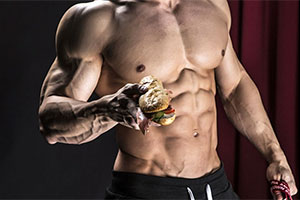Don’t worry be happy could just as easily be ‘don’t worry be skinny’ if we examine the link between stress and weight loss. ( ‘Lean’ would have been a better word, but ‘skinny’ fit better)
I know it sounds Taoist or Zen, but your emotions and your outlook on life play an important role in your health. We’ve known this for an exceptionally long period of time, yet for some reason, we like to ignore it.
(Why work on your outlook on life when you can just take a supplement or eat organic?)
But the truth is, it is important. Stress can have a profound effect not only on weight loss, but also your quality of life. Take the following as an example:
The first documented account of the existence, composition, and fate of chylomicrons was made by S. H. Gage in 1924. And while our knowledge about these compounds has increased exponentially since 1924, there is one piece of information from the original research that we have completely ignored for, well almost a century now.
According to his Key Note Speech on the topic of Nutritional adaptations in 1979, Rene Dubos explained the following:
It reported in detail and with striking time curves that the fate of chylomicrons was profoundly influenced by emotional states. The prospect of having to give a lecture on anatomy was sufficient profoundly alter the rate at which chylomicrons disappeared from the blood.
This is important because Chylomicrons transport the fat from your food to your liver, body fat stores, heart and skeletal muscle tissue, where their triglyceride components are unloaded for use or storage. Basically, they’re the school bus for the fat you eat, taking it through your blood and dropping it off at various locations.
So emotional stress can have a large and immediate impact on fat metabolism.
Here’s another amazing story form the same talk:
A nutritional and medical survey was carried out from 1955 to 1961 in the Pennsylvania town of Roseto. At that time, 90% of the town’s 1630 inhabitants were descendants of Italian settlers.
The Rosetans ate at least as much saturated fat as other Americans, they took large meals, drank a great deal of wine, and most of them were overweight.
Yet, not a single Rosetan male under 50 died of heart attack during the 6 years covered by the survey, and the incidence of heart disease among older men was less than half what it was in neighboring towns.
According to the conclusions of the survey the rarity of heart disease in Roseto might have been due to some genetic peculiarities of the Rosetans or to their ways of life: “gay, boisterous and unpretentious, mutually trusting (there is no crime in Roseto) and mutually supporting.”
The Rosetans themselves explained their good state of health by the fact that they simply did not worry much. Their heart attack rate seems to have increased and to have reached the United States norm when they moved to large cities and had to change their ways of life.
This sounds eerily similar to something that Dr. Aubrey DeGrey (Author of Ending Aging) once told me at a meeting in Cambridge. I asked him if there was any common characteristic that was shared by all the centurions (people living over the age of 100) that he had met. His answer was “they all smile a lot”.
So stress and life situations are important. They play a role in inflammation (see www.inflammationtheory.com), and they play a direct role in fat metabolism, and probably a whole host of other metabolic processes.
But here’s the million dollar question:
How do you manage stress?
I get that when you are stressed out, nothing is more annoying then someone telling you that you need to relax.
I will also guess that just like inflammation, the stress response is actually a good one in small/acute doses.
What we DON’T want is chronic stress.
So here’s the best piece of advice I can offer you – If something is stressing you out deal with it as quickly as possible. Don’t let it linger.
When it comes to dealing with things that are stressing you out, whether it’s your weight, your job or your relationships an excellent adage:
There’s no time like the present.
This is probably why I like Eat Stop Eat so much…it deals with the issue in an immediate manner, and tends to be a low stress undertaking.
BP









